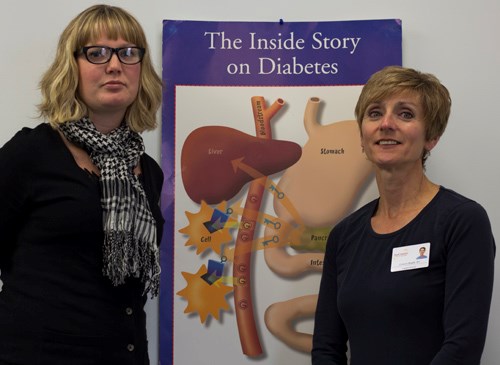November is a month of remembrance and awareness. On the 11th, we pause to remember the sacrifices of our service men and women. During this month, we may also notice more men sporting moustaches as part of "Movember"-the popular campaign to raise awareness and funds for men's health issues such as prostate cancer. November is also a month of awareness for diabetes-a chronic condition affecting approximately 1.8 million Canadians and 48 thousand of Saskatchewan's residents (a disproportionate number of which are First Nations living on reserves) according to Statistics Canada and Health Canada.
The most common types of diabetes are type 1, type 2 and gestational diabetes. Each type interferes with the body's ability to either create or use insulin-a hormone that is produced by the pancreas that is instrumental in metabolizing nutrients. Basically, we need insulin to transform food into energy for basic bodily functions such as growth, movement and repair. Dr. Frederick Banting and Charles Best's discovery of insulin in 1921 at the University of Toronto is considered to be one of the most significant achievements in twentieth century medicine - one that earned them and their colleagues the Nobel Prize in Medicine in 1923.
According to Health Canada, risk factors for diabetes include: being part of an advanced age group, being overweight, lack of exercise, having high cholesterol and/or high blood pressure, having diabetes in your family history and belonging to a high-risk ethnic group; for example, Aboriginal, Asian, Hispanic and African peoples.
Carlyle has a team of experts dedicated to diabetes prevention, management and education. Laura Thompson, a registered dietitian, and Francis Boutin, a diabetes nurse educator, are with Sun Country Health Region and hold diabetes clinics once per week at the Community Services building located at 206 Railway Avenue East and twice per month at the Carlyle Medical Clinic at 214 Main Street. The clinics are self-referral and focus on prevention for pre-diabetes patients, and medication and lifestyles adjustments for patients with the condition. The clinics are also held once a month in Arcola at the Family Health Clinic located at 707 Brock Ave. The team is also available to provide community sessions. For more information about the clinics and sessions contact Francis Boutin at 453-2319 or Laura Thompson at 453-2075.
Kay Steele, Chronic Disease Clinical Lead with Sun Country Health Region, explained that diabetes is not just about blood sugar control-something many people consider as being the sole treatment for the condition; vascular protection is also important and is becoming a focus of diabetes management. Managing cholesterol and blood pressure, for example, are important measures for staying healthy with the condition. Ways for managing diabetes are improving, according Steele-a trend that Banting and his colleagues would certainly endorse.



